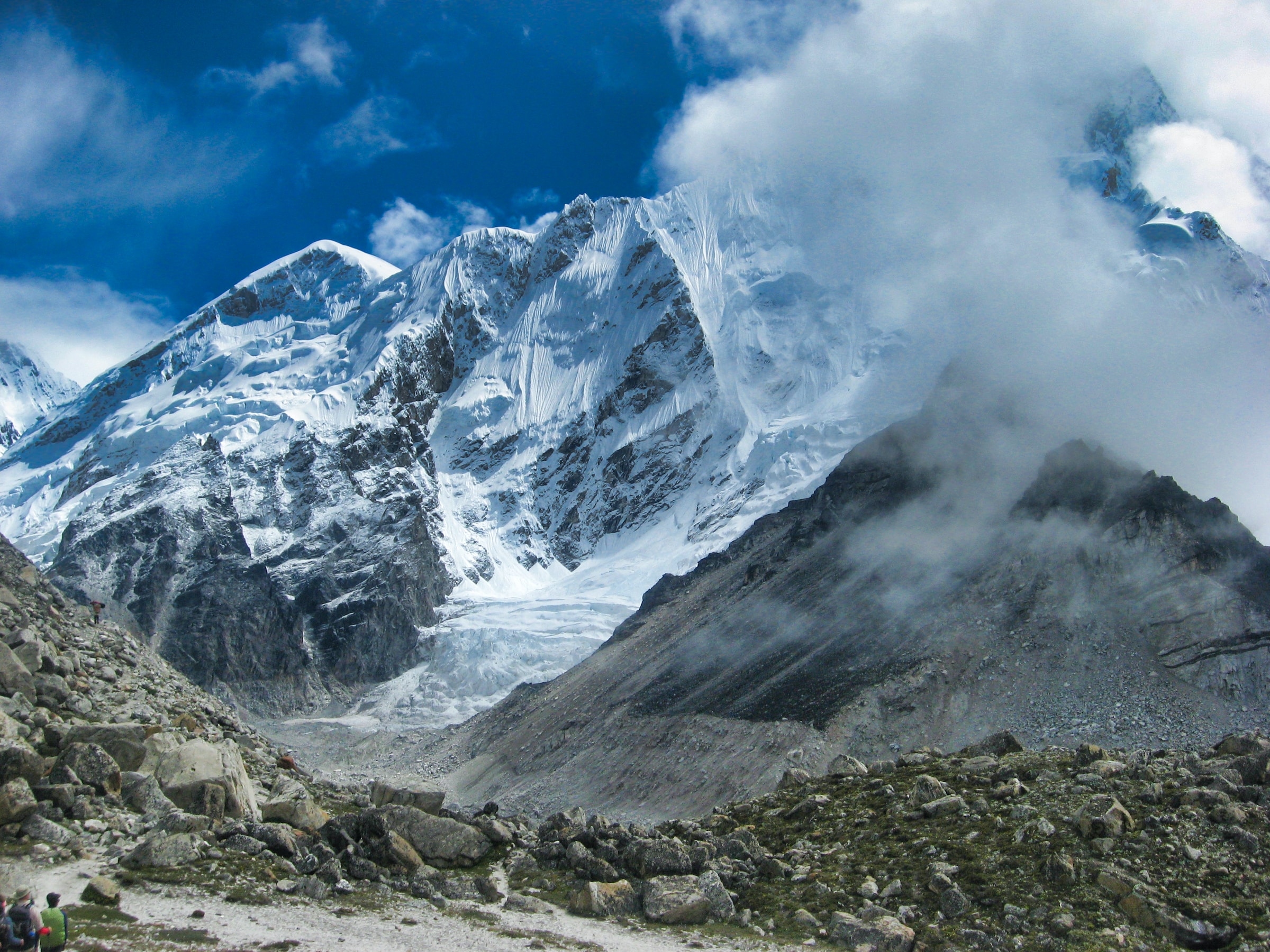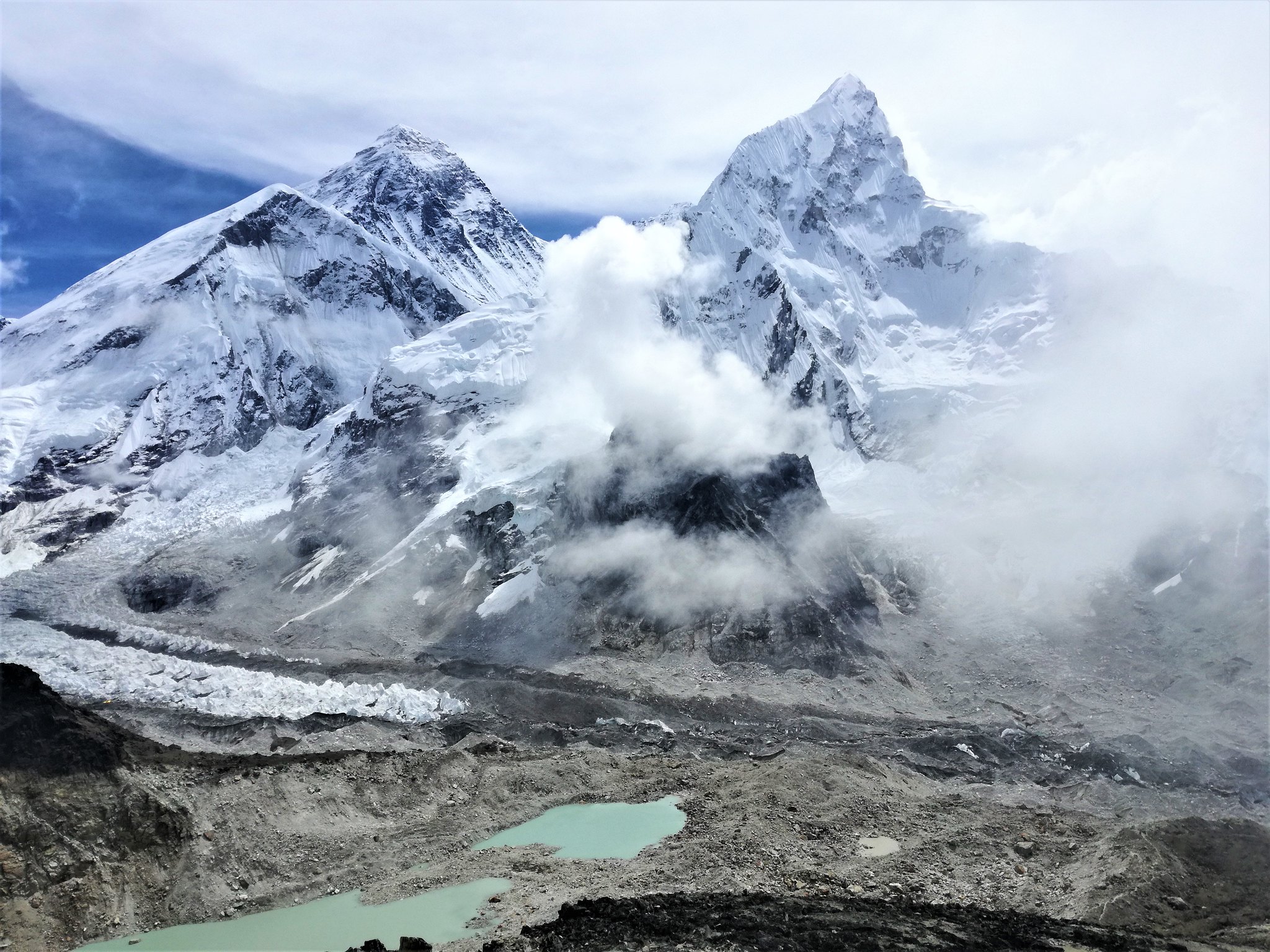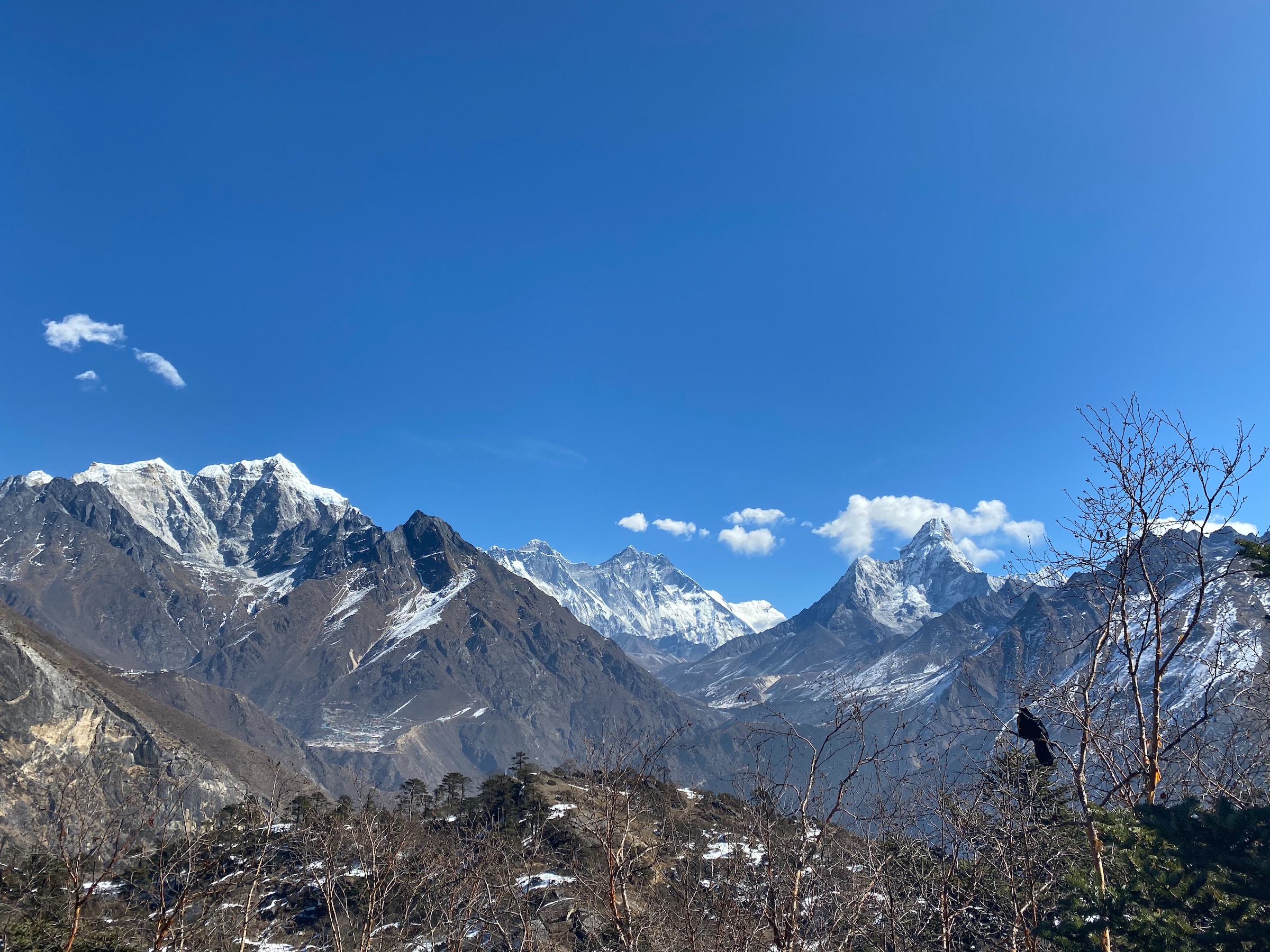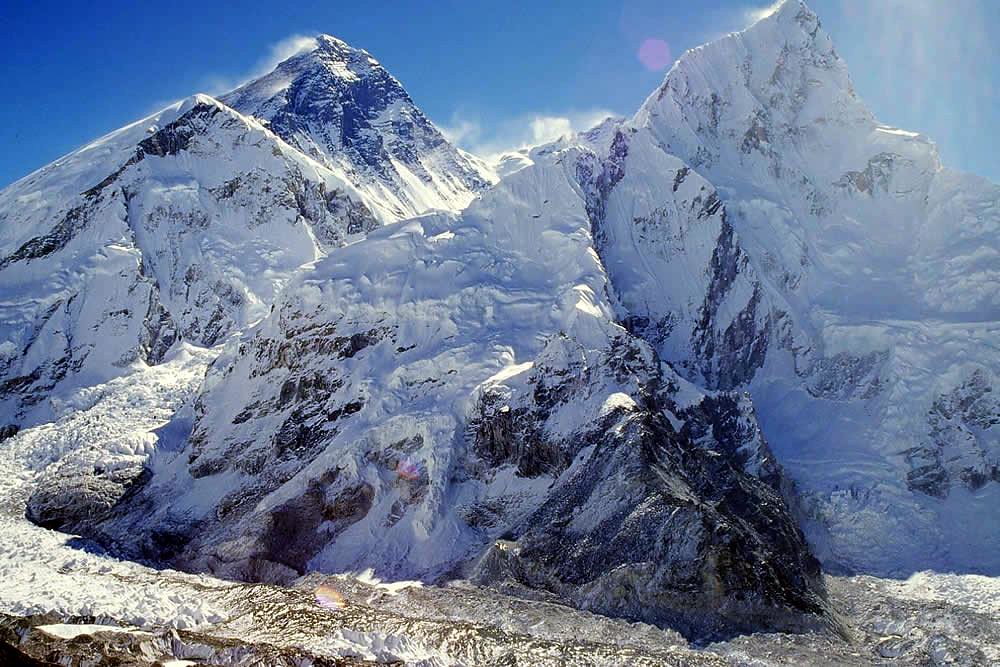Understanding the Seasonal Variations
The timing of your Everest Base Camp trek significantly impacts the overall experience and level of difficulty. Here's a breakdown of the seasons and their implications:
Spring Season (March to June): Characterized by favourable weather conditions, with temperatures ranging up to 25 degrees Celsius during the day. However, nights can be chilly, dropping to as low as -20 degrees Celsius. This season attracts a large influx of tourists seeking optimal trekking conditions.
Monsoon Season (July to mid-September): Not recommended for trekking due to heavy rainfall, which leads to slippery and treacherous trails. The risk of landslides and avalanches further complicates trekking during this period.
Autumn (September to November): Widely regarded as the best time for trekking in the Everest region. The weather is stable, offering clear skies and breathtaking views of the surrounding landscape. Additionally, the entire region comes alive with vibrant rhododendrons and other wildflowers.
.jpg) Winter (November to February): Characterized by extreme cold, with temperatures plummeting to -36 degrees Celsius. January, in particular, is the coldest month, with the potential for temperatures to drop below -60 degrees Celsius. High winds, including hurricane-force gusts, pose additional challenges for trekkers.
Winter (November to February): Characterized by extreme cold, with temperatures plummeting to -36 degrees Celsius. January, in particular, is the coldest month, with the potential for temperatures to drop below -60 degrees Celsius. High winds, including hurricane-force gusts, pose additional challenges for trekkers.
The Everest Base Camp Route
Navigating the route to Everest Base Camp is a journey fraught with challenges, yet it promises unparalleled rewards for those willing to undertake it. Here's an overview of the iconic trekking route:
Starting Point: The trek typically begins with a scenic flight from Kathmandu to Lukla, home to one of the world's most dangerous airports. From Lukla (2,800 m), trekkers commence their journey towards Everest Base Camp.
Key Landmarks: En route to Everest Base Camp, trekkers encounter a diverse array of landscapes and cultural landmarks. Highlights include the bustling Sherpa town of Namche Bazaar, the iconic Tengboche Monastery, and the breathtaking vistas of Lobuche and Gorak Shep.
Altitude Gain: One of the primary challenges of the Everest Base Camp trek is the significant altitude gain. Starting at an elevation of 3,000 meters and ascending to 5,364 meters at Everest Base Camp, trekkers must acclimatize carefully to avoid altitude sickness.

Difficulty Levels
While the Everest Base Camp trek is accessible to individuals with moderate fitness levels, several factors contribute to its overall difficulty:
Altitude: The extreme altitude poses a significant challenge for trekkers, increasing the risk of altitude-related illnesses such as acute mountain sickness (AMS). Proper acclimatization and awareness of altitude sickness symptoms are essential for a safe trekking experience.
Distance: Covering a distance of approximately 130 kilometres round trip, the Everest Base Camp trek requires endurance and stamina. The rugged terrain, including rocky and steep paths, adds to the physical demands of the journey.
Training Requirements: Preparation is key to tackling the challenges of the Everest Base Camp trek. Trekkers are advised to engage in regular physical exercise, focusing on cardiovascular fitness and leg strength. Training hikes and stair climbing can help prepare the body for the rigours of trekking at high altitudes.
Essential Safety Measures and Etiquette
Ensuring safety and practising responsible trekking etiquette are paramount throughout the Everest Base Camp journey. Here are some essential tips to consider:
Weather Preparedness: Be prepared for harsh weather conditions by carrying essential gear such as warm clothing, waterproof layers, and a well-stocked first aid kit. Stay hydrated and protect yourself from the sun's rays with sunscreen and sunglasses.
Altitude Awareness: Monitor your health closely and be vigilant for symptoms of altitude sickness, including headache, nausea, and dizziness. Ascend gradually, allowing time for proper acclimatization, and be prepared to descend if symptoms worsen.
Environmental Respect: Respect the fragile Himalayan ecosystem by adhering to Leave No Trace principles. Dispose of waste responsibly, minimize noise pollution, and avoid disturbing wildlife.
Cultural Sensitivity: Show respect for local customs and traditions, including Buddhist religious sites and practices. Yield to passing yaks and mules on narrow trails, and refrain from giving money to begging children, opting to support local community initiatives instead.

The Perfect Everest Base Camp Itinerary
Day 1:Arrival in Kathmandu
Day 2:Kathmandu – Lukla [2,840m] by flight, 35 mins – Trek from Lukla to Phakding, 3-4 hrs trek
Day 3:Trek from Phakding – Namche Bazaar 6-8 hrs
Day 4:Namche Bazaar: Acclimatization and Exploration day
Day 5:Trek from Namche Bazaar – Tengboche 5-6 hrs
Day 6:Trek from Tengboche - Dingboche 5-6 hrs
Day 7:Dingboche: Acclimatization and Exploration day
Day 8:Trek from Dingboche – Lobuche 4-5 hrs
Day 9:Trek from Lobuche – Gorakshep [5,160m] – Everest Base Camp [5,364m] – Gorakshep, 7-8 hrs
Day 10:Trek from Gorakshep – Kalapatthar [5,545m] – Pheriche [4,280m] 7-8 hrs
Day 11:Trek from Pheriche – Namche Bazaar 8-9 hrs
Day 12:Trek from Namche Bazaar – Lukla 7-8 hrs
Day 13:Flight from Lukla –to Kathmandu 35 min flight.
Day 14:Departure
EBC Cost included
- Airport picks up and drops by private vehicle.
- 4 nights’ accommodation in Kathmandu with a bed and breakfast basis.
- Kathmandu sightseeing by Private guide and private transportation
- Kathmandu – Lukla – Kathmandu flight fare.
- All ground transportation by private vehicle.
- Your standard meals (Breakfast, Lunch, and Dinner) during the trekking.
- All necessary paperwork conservation area, and restricted area entry permits.
- All accommodations in hotels, lodges/tea houses during the trek.
- An experienced Government-licensed guide and porter.
- Medical supplies (first aid kit will be available).
- Farewell dinner with a typical Nepali restaurant
- All government taxes
EBC Cost excluded
- International Airfare
- Nepal entry visa
- Personal Expenses
- Travel and Rescue Insurance
- Extra accommodation and food charges in Kathmandu
- Tips and gratitude to the guide, porters, and drivers
Choosing a Reliable Trekking Company
When embarking on the iconic journey to Everest Base Camp, selecting a reputable trekking company is paramount to ensuring a safe and memorable experience. Among the myriad options available, Everest Base Camp Trekking stands out as a trusted provider of unparalleled adventure experiences. Here's why you should entrust your Everest Base Camp trek to this esteemed company:

Established Legacy of Excellence
Since its inception in 2017, Everest Base Camp Trekking has been synonymous with excellence in adventure tourism. With a steadfast commitment to providing top-tier service and unforgettable experiences, the company has earned the trust and admiration of trekkers worldwide.
Tailored Trekking Packages
Everest Base Camp Trekking understands that every adventurer is unique, with distinct preferences and requirements. That's why they offer a diverse range of trekking packages designed to cater to a variety of interests and skill levels. Whether you're seeking a challenging expedition or a leisurely trek with breathtaking vistas, they have the perfect itinerary for you.
Commitment to Quality Service
At Everest Base Camp Trekking, quality service is more than just a promise—it's a way of life. From experienced guides to impeccable logistical support, every aspect of your journey is meticulously planned and executed to ensure your comfort, safety, and satisfaction.
.jpg)
Why Choose Eternal Himalaya?
- Exceptional Success Rate: With a track record of success that exceeds industry standards, Everest Base Camp Trekking boasts an exceptional success rate, ensuring that your trek is not only memorable but also successful in reaching its intended destination.
- Community Development and Conservation: Beyond providing unparalleled adventure experiences, Everest Base Camp Trekking is deeply committed to community development and environmental conservation. Through active involvement in local initiatives, the company strives to make a positive impact on the regions it operates in.
- Extensive Experience: With years of experience in organizing treks, expeditions, and adventure tours, Everest Base Camp Trekking possesses the expertise and knowledge needed to ensure a seamless and enjoyable journey. Whether you're a novice trekker or a seasoned mountaineer, you can trust their team to guide you every step of the way.
People also asked
How fit do you need to be to trek Everest Base Camp?
To trek to Everest Base Camp, a moderate level of fitness is required. While not excessively strenuous, the journey involves daily hiking for several hours, often at high altitudes. Prior endurance training and cardiovascular fitness will enhance enjoyment and help cope with the challenges of ascending to over 5,000 meters above sea level.
Is it difficult to trek to Everest Base Camp?
Trekking to Everest Base Camp presents challenges, but with proper preparation and guidance, it's achievable for most. Altitude, rugged terrain, and variable weather can test trekkers. Experienced guides, gradual acclimatization, and physical fitness help mitigate difficulties, ensuring a rewarding adventure amidst the world's highest peaks.
Can beginners hike to Everest Base Camp?
Beginners can hike to Everest Base Camp with proper preparation and guidance. While previous trekking experience is beneficial, it's not mandatory. A well-planned itinerary with gradual altitude gains, ample rest, and guidance from experienced guides can make the journey accessible and fulfilling for novices, fostering a sense of accomplishment amidst breathtaking Himalayan scenery.
Can a normal person trek to Everest Base Camp?
Yes, a normal person can trek to Everest Base Camp with adequate preparation and support. While physical fitness and mental determination are essential, there's no specific prerequisite beyond good health and a willingness to embrace the challenge. With proper guidance, anyone with a sense of adventure can embark on this iconic Himalayan journey.
What is the success rate of the Everest Base Camp Trek?
The success rate of the Everest Base Camp Trek varies, influenced by factors like weather, altitude sickness, and individual fitness levels. Generally, with proper acclimatization, experienced guides, and careful planning, the success rate is high, exceeding 90% for most reputable trekking companies, ensuring a memorable and fulfilling journey.
Can you visit Everest Base Camp without climbing?
Yes, you can visit Everest Base Camp without climbing. Many trekkers journey to this iconic site for its breathtaking scenery and cultural experience without attempting the summit. The trek offers unparalleled views of Everest and surrounding peaks, providing a rewarding adventure for nature enthusiasts and adventurers alike.
Can you do Everest Base Camp without training?
While training is highly recommended, it's possible to trek to Everest Base Camp without extensive preparation. However, physical fitness significantly enhances the experience and minimizes the risks of altitude sickness and fatigue. Beginners should start with shorter hikes and gradually increase endurance to ensure a more enjoyable and safe journey
Why do people go to Everest Base Camp?
People trek to Everest Base Camp for its unparalleled natural beauty, cultural immersion, and personal challenge. The journey offers breathtaking views of the world's highest peaks, encounters with Sherpa culture, and a sense of accomplishment. Whether seeking adventure, spiritual growth, or simply to tick off a bucket list item, EBC promises unforgettable experiences.

Conclusion:
While the Everest Base Camp trek presents its fair share of challenges, choosing the right trekking company can make all the difference. With Everest Base Camp Trekking by your side, you can embark on this exhilarating adventure with confidence, knowing that you're in the hands of seasoned professionals who are dedicated to making your journey truly unforgettable. So, lace up your boots, pack your bags, and get ready to conquer the majestic heights of Everest Base Camp with Eternal Himalaya Trekking Company.


.jpg)
.jpg) Winter (November to February): Characterized by extreme cold, with temperatures plummeting to -36 degrees Celsius. January, in particular, is the coldest month, with the potential for temperatures to drop below -60 degrees Celsius. High winds, including hurricane-force gusts, pose additional challenges for trekkers.
Winter (November to February): Characterized by extreme cold, with temperatures plummeting to -36 degrees Celsius. January, in particular, is the coldest month, with the potential for temperatures to drop below -60 degrees Celsius. High winds, including hurricane-force gusts, pose additional challenges for trekkers.


.jpg)

